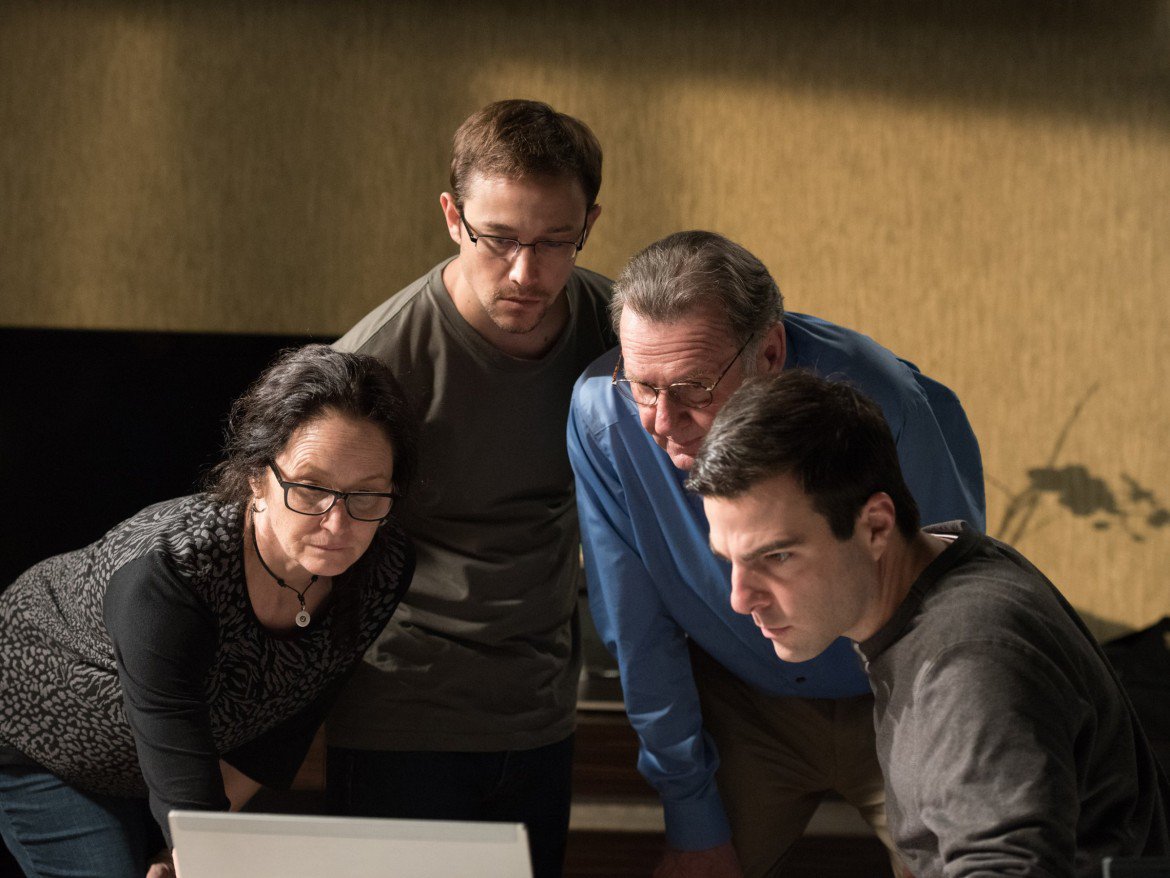Review
In ‘Snowden,’ the parable of the patriot traitor
The Oliver Stone biopic that no major American distributor wanted to touch.

We are almost a 100 days from the end the of the Obama presidency, and the three major organizations for civil rights in the U.S. — Human Rights Watch, the American Civil Liberties Union and Amnesty International — have started a joint campaign for the pardon of Edward Snowden.
With 168,000 signatures (the initial target was 100,000), the online petition for the cause now includes the names George Soros, Steve Wozniak, Twitter founder Jack Dorsey, former CIA and FBI agents (like Valerie Plame), and figures from the world of culture and entertainment: Francine Prose, Laurie Anderson, Michael Stipe, Jean Michel Jarre, Danny Glover, Joyce Carol Oates and Daniel Radcliffe. After Citizenfour, the documentary by Laura Poitras, which is not only beautiful but has been “validated” in the mainstream with an Oscar, now Oliver Stone brings to the big screen a great case for the former NSA analyst.
The parable of young patriotic and idealistic Americans who gradually are disillusioned by their government or father figures, who, in their eyes, embodied the American Dream, is a leitmotif that runs through Stone’s filmography. He has often admitted he identifies with these characters. And Snowden is not only thematically close to some of his most famous films, such as Platoon, Born on the Fourth of July and Wall Street, but it finds again the focused energy and effectiveness.
The film is adapted from the novel Time of the Octopus, written by Anatoly Kucherena, Edward Snowden’s lawyer in Moscow, and Luke Harding’s book The Snowden Files: The Inside Story of the World’s Most Wanted Man. And it was also written in collaboration with Snowden himself, who appears briefly at the end of the film.
Stone’s latest work does not have the aesthetic, political and narrative complexity of JFK or the existential darkness of Nixon. It is a flatter film, with a linear story, despite the flashback structure. The movie’s mood is less conspiratorial and his vision of a world now hostage to the political and financial cyberwars is less grandly philosophical and abstract than Blackhat by Michael Mann. Stone’s work is more “people-oriented” and in this, Stone, not Mann, exemplifies the real product of the Sixties utopia.
We meet his Edward Snowden (played by Joseph Gordon-Levitt, the best interpretation of his career) in uniform, at a military training camp for Special Forces. He desperately hopes to join, but you can see he is in trouble with the most strenuous tests, his glasses slip down the nose, the sergeant who dislikes him. He is dismissed for a fractured tibia, caused by an intentional fall from the cot. But his patriotism is intact. He then decides to try with the CIA, where his outstanding IT skills are immediately recognized by Director Corbin O’Brian (Rhys Ifans) who takes him under his protection. This character, said Stone, was inspired by Orwell’s 1984 character Winston Smith.
According to an interview the director gave to WIRED, the inspirations of this Snowden are Joseph Campbell, Henry Thoreau, Star Wars and Ayn Rand (“a man can stop the world’s engine by himself”). He also describes his subject as a libertarian, initially fascinated by the Tea Party: He is a “very good boy who was conservative by nature, motivated by Sept. 11 to join the Army and later the NSA. And he then changed over a period of time. We stuck to the spirit of the truth. But we had to protect him as well as the people he’s been with.”
In Snowden (“a dramatic recreation of true events,” as indicated at the beginning of the film), even before suspecting that the programs he is fervently working on will be used to violate the privacy of millions of Americans, an encounter with a girl makes alarm bells ring in Ed’s mind. She is Lindsay Mills (played by Shailene Woodley, the heroine of Divergent and the teen melodrama Fault in Our Stars). Stone makes a curious and partly romantic choice: He anchors the story on their relationship (Mills, who lived with Snowden in Hawaii, has joined him in Moscow). She follows him to Switzerland, Japan and then to Oahu — from promotion to promotion: The Snowden of the film is not a simple analyst but a brilliant star, first at the CIA and then the NSA, where he got disillusioned.
The other hinge of the narrative is the meeting in Hong Kong with Laura Poitras (played by Melissa Leo) and Glenn Greenwald (Zachary Quinto). Stone turns this scene into almost an homage to Citizenfour; he even replicated some of the shots. Between the two, the film weaves the story a crisis of conscience that leads to a very difficult but inevitable personal decision. The tone is of quiet heroism, not of activism. This is a film that can please even detractors of Stone’s political views, to the point that some critics have found it too soft. Nevertheless, no major studio wanted to produce it or distribute the film in the U.S. It took an independent distributor (Open Roads) and large injections of German and French capital.
What are the chances that Obama will pardon Snowden before leaving? According to the bookies, very little.
Originally published at http://ilmanifesto.info/snowden-la-parabola-del-patriota-traditore/ on 2016-09-23
